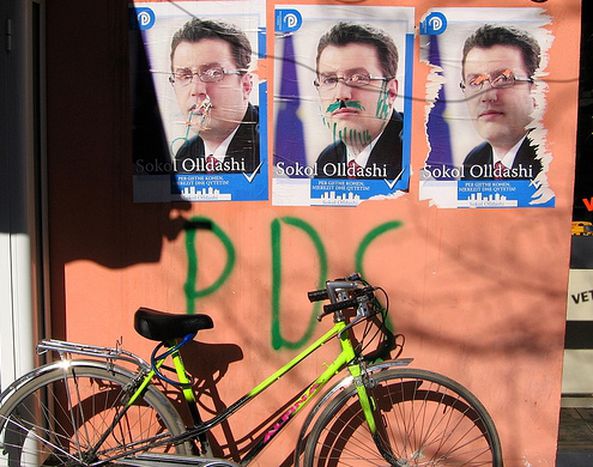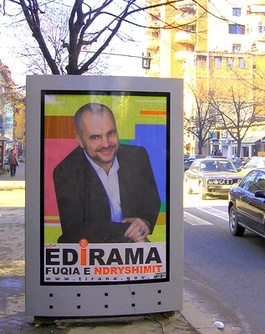
Albania elections: neck-and-neck
Published on
Translation by:
 Darren Thompson
Darren Thompson
The European Union is watching. As Albanians chose their new parliament and their new (or old) representatives on 28 June, a look at a 'chauvinist society', the quota of women in electoral results and 'young' political parties
Four years have passed since the 2005 elections, won by Sali Berisha and it is he (who was also president between 1992 and 1997) who once again led the democratic party of Albania in the elections on 28 June. Edi Rama rises from the opposition’s benches - the socialist party of Albania - as his running rival. Rama is a former painter and professor at the academy of fine arts. He is in his third term as the mayor of Tirana, and took the reins of the socialist party from Fatos Nano after the 2005 election defeat.
Nato and Europe
 In this suffocatingly hot June in Tirana 'pre-electoral tension has reached its peak,' claims Albert Zholi, journalist and author. 'Both Berisha and Rama have stated they will step down should they be defeated.' The mayor persists in his criticism of the corruption which rampages through the current government; its successful electoral campaign four years ago included a pledge to beat the said corruption afflicting the nation. Meanwhile Berisha flaunts the successes of his first term as prime minister, such as the construction of a motorway which unites Albania and Kosovo and the April 2009 entrance of the country to Nato. 'Albania has been involved for years in Nato missions, like Afghanistan and Iraq,' states Dashamir Shehi, former deputy prime minister and founder of the small LZHK (movement for the future of Albania) party. 'Entrance to NATO has been nothing but a natural outcome.' Berisha put his country's bid in for EU membership in the same month. 'The European response will be based upon the results obtained in the fight against unemployment, corruption, illegal immigration and human trafficking, in addition to law reforms,' underlines Zholi. 'All Albanians know that these are the issues that matter.' 'They are fundamental objectives that must be accomplished, primarily for our own good,' adds Shehi, suggesting that it is necessary that Albania now has a public debate on what entrance into Europe entails. The general consensus is that the only matter considered important is free movement within the EU. This is currently dependent on a much desired visa, which is difficult to obtain for a large proportion of the population.
In this suffocatingly hot June in Tirana 'pre-electoral tension has reached its peak,' claims Albert Zholi, journalist and author. 'Both Berisha and Rama have stated they will step down should they be defeated.' The mayor persists in his criticism of the corruption which rampages through the current government; its successful electoral campaign four years ago included a pledge to beat the said corruption afflicting the nation. Meanwhile Berisha flaunts the successes of his first term as prime minister, such as the construction of a motorway which unites Albania and Kosovo and the April 2009 entrance of the country to Nato. 'Albania has been involved for years in Nato missions, like Afghanistan and Iraq,' states Dashamir Shehi, former deputy prime minister and founder of the small LZHK (movement for the future of Albania) party. 'Entrance to NATO has been nothing but a natural outcome.' Berisha put his country's bid in for EU membership in the same month. 'The European response will be based upon the results obtained in the fight against unemployment, corruption, illegal immigration and human trafficking, in addition to law reforms,' underlines Zholi. 'All Albanians know that these are the issues that matter.' 'They are fundamental objectives that must be accomplished, primarily for our own good,' adds Shehi, suggesting that it is necessary that Albania now has a public debate on what entrance into Europe entails. The general consensus is that the only matter considered important is free movement within the EU. This is currently dependent on a much desired visa, which is difficult to obtain for a large proportion of the population.
So, what’s the problem? Women!
When the electoral campaign was underway, attention was diverted to other matters, like electoral law and quotas on women. According to Shehi, the electoral law 'is lethal for smaller parties as it imposes extremely high thresholds on election.' Furthermore, closed registers leave all the power in the hands of the parties, which puts the representation of candidates at risk. Many registers throughout the country have been rejected so that the parties can correct them to not include the 30% representation of women as the new law demands, causing great confrontation. Many sustain that here, politics remains a profession for men, pursuant to high level of offences, insults and explosive discussions that characterise them. 'Albanian society is still very chauvinist,' explains Zholi. 'This mentality is changing in Tirana, but its not the same in rural areas.' The option on quotas for women can given them greater security and push them to participate more in public life, especially in closed topics away from the capital,' concludes Shehi.
G99: power in the hands of the young
It seems something similar is happening amongst the young. The new G99 party is focussed solely on involving students and graduates, some of whom have decided to return to the country to help the party’s founder, Erion Velaij, who was born in 1979. Edi Rama’s socialist party also attracts the youth vote, swayed by the idea that the whole of Albania can follow the model of modernisation set down by Tirana. 'How are they going to make a change as the parties, who would never have been elected without them, have them cornered?' Shehi has found himself wondering. Zholi underlines the fact that 'the seeds have not been sowed for the progressive thought that is carried amidst young people to flourish. Everyone knows that in Albania, party leaders and their ministers are the ones that created the same parties in 1991, nineteen years ago.'
In Albania party leaders and their ministers are the ones that created the same parties in 1991, 19 years ago
But the names of the two biggest coalitions currently in existence - alliance of change and unification for changes - symbolise the desire of all Albanians: that 28 June 2009 represents a turning point which sees the end of a 20-year post communist transition and the beginning of a path towards Europe.
Translated from Elezioni in Albania: largo ai giovani?


